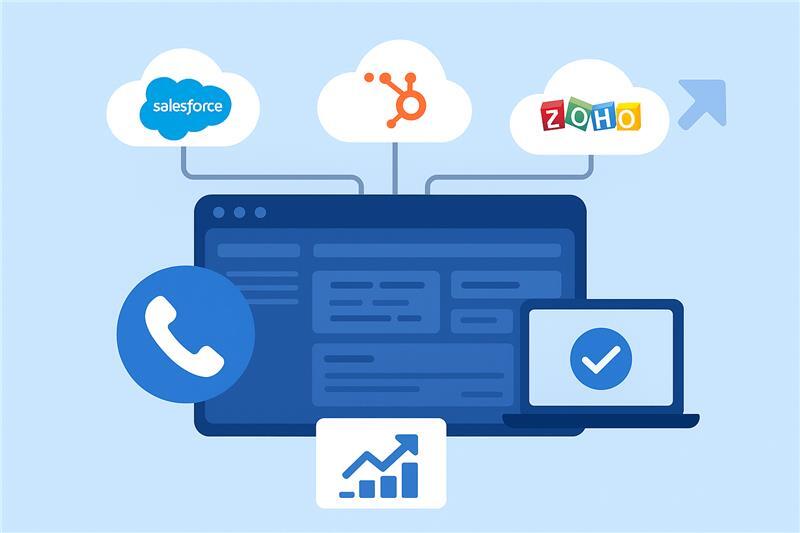
How AI Enhances Conceptual Selling: Strategies, Tools, and Methodology
Understanding the Core of Conceptual Selling
Before we delve into advanced strategies, it's crucial to understand the foundation of conceptual selling. At its heart, conceptual selling is about understanding the customer's concept of their needs and offering solutions that fit within that framework. This approach requires a deep understanding of the customer, active listening, and a focus on providing value.
In today’s competitive sales environment, leveraging Artificial Intelligence (AI) can significantly enhance conceptual selling approaches. By integrating AI into your sales strategy, you can gain deeper insights, automate repetitive tasks, and personalize customer interactions more effectively. This article explores how AI supports conceptual selling, including its benefits, strategies, tools, and methodology.
What is Conceptual Selling?
Conceptual selling is a sales methodology that emphasizes understanding a customer's needs and aligning your solutions with their broader business objectives. Unlike traditional sales approaches that focus primarily on pitching products or services, conceptual selling centers around grasping the customer's overarching vision and challenges. This approach requires:
- Deep Understanding: Sales professionals must gain a comprehensive understanding of the customer’s industry, business model, and specific pain points.
- Active Listening: Engaging in meaningful conversations to uncover the customer’s needs and goals.
- Value Alignment: Presenting solutions that not only meet immediate needs but also align with the customer’s long-term objectives.
Conceptual selling is about building a relationship and offering solutions that fit seamlessly into the customer’s broader framework, making it a more strategic and customer-centric approach.
Benefits of Leveraging AI for Conceptual Selling
1. Enhanced Customer Insights
Deeper Analysis: AI can analyze large volumes of customer data to identify trends and insights that human analysis might miss. This leads to a more profound understanding of customer behavior and preferences.
Predictive Insights: AI tools can forecast future customer needs based on historical data, allowing sales teams to anticipate and address potential challenges before they arise.

2. Personalized Customer Experiences
- Tailored Solutions: AI enables highly personalized interactions by analyzing customer data and suggesting solutions that precisely match individual needs and preferences.
- Dynamic Engagement: AI can adjust messaging and content in real-time based on customer interactions, ensuring that communications remain relevant and impactful.
3. Increased Efficiency
- Automation of Repetitive Tasks: AI can automate time-consuming tasks such as lead scoring, data entry, and follow-up reminders, allowing sales teams to focus on high-value activities.
- Optimized Processes: AI can streamline sales processes by providing real-time recommendations and insights, enhancing productivity and effectiveness.
4. Improved Lead Generation and Conversions
- Predictive Lead Scoring: AI can evaluate leads based on their likelihood to convert, helping sales teams prioritize their efforts and focus on the most promising opportunities.
- Targeted Outreach: AI-driven analytics can identify high-value prospects and tailor outreach strategies to maximize engagement and conversion rates.
5. Enhanced Sales Strategy
- Data-Driven Decisions: AI provides actionable insights that inform strategic decisions, enabling sales teams to develop more effective and targeted sales strategies.
- Performance Tracking: AI tools can monitor and analyze sales performance metrics, helping teams identify areas for improvement and optimize their approach.
Strategies for Leveraging AI in Conceptual Selling
1. Integrate AI with CRM Systems
- Enhanced Data Accuracy: Combine AI with Customer Relationship Management (CRM) systems to improve data accuracy and provide real-time insights.
- Streamlined Processes: Use AI to automate routine tasks within your CRM, such as updating customer records and scheduling follow-ups.
2. Utilize AI for Predictive Lead Generation
- Lead Scoring Models: Implement AI-driven lead scoring models to prioritize leads based on their likelihood to convert.
- Targeted Campaigns: Use predictive analytics to design targeted marketing campaigns that resonate with high-potential leads.
3. Implement AI-Driven Personalization
- Content Recommendations: Leverage AI to provide personalized content recommendations that align with individual customer interests and needs.
- Adaptive Messaging: Use AI to adjust messaging in real-time based on customer interactions and feedback.
4. Adopt AI-Powered Sales Assistants
- Virtual Assistants: Deploy AI-powered sales assistants to provide real-time information, answer customer queries, and offer recommendations.
- Automation of Administrative Tasks: Use AI assistants to handle administrative tasks such as scheduling meetings and managing follow-ups.
5. Monitor and Optimize with AI Analytics
- Performance Metrics: Use AI analytics to track key performance indicators and assess the effectiveness of your sales strategies.
- Continuous Improvement: Analyze AI-driven insights to identify areas for improvement and refine your sales approach accordingly.
Methodology for Implementing AI in Conceptual Selling
Step 1: Define Objectives and Metrics
- Set Clear Goals: Establish specific objectives for integrating AI into your conceptual selling process, such as improving lead conversion rates or enhancing customer insights.
- Identify Metrics: Determine the key metrics that will measure the success of your AI implementation.
Step 2: Select the Right AI Tools
- Assess Needs: Choose AI tools that align with your sales objectives and integrate seamlessly with your existing systems.
- Evaluate Features: Consider factors such as ease of use, scalability, and compatibility when selecting AI tools.
Step 3: Train Your Sales Team
- Provide Training: Ensure your sales team is trained on how to use AI tools effectively and how to interpret AI-driven insights.
- Foster Adoption: Encourage adoption of AI tools by demonstrating their benefits and providing ongoing support.
Step 4: Monitor Performance and Adjust
- Track Progress: Regularly monitor the performance of your AI-enhanced sales processes and evaluate their impact on sales metrics.
- Make Adjustments: Use AI-driven insights to identify areas for improvement and make data-driven adjustments to your sales strategies.
Step 5: Continuously Innovate
- Stay Updated: Keep abreast of the latest advancements in AI technology and explore new ways to leverage AI in your sales process.
- Encourage Experimentation: Foster a culture of innovation and experimentation to stay ahead in the competitive sales landscape.
AI is transforming conceptual selling by providing deeper insights, enhancing personalization, automating routine tasks, and optimizing sales strategies. By integrating AI into your sales approach, you can build stronger customer relationships, improve efficiency, and achieve superior sales results. Embrace AI tools, implement effective strategies, and continuously refine your approach to stay ahead in the dynamic world of sales.
Tools and Technologies for AI-Enhanced Conceptual Selling
1. Salesken AI
- Features: AI-driven revenue intelligence, sales coaching, conversation analytics, and performance optimization.
- Benefits: Enhances sales team effectiveness, provides real-time feedback, and improves sales outcomes through actionable revenue insights
2. Salesforce Einstein
- Features: AI-powered analytics, predictive lead scoring, and automated data entry.
- Benefits: Provides actionable insights, improves data accuracy, and enhances sales performance.
3. HubSpot Sales
- Features: AI-driven lead scoring, email tracking, and content recommendations.
- Benefits: Automates lead management, personalizes communication, and increases efficiency.
4. ZoomInfo
- Features: AI-powered lead generation, account-based marketing, and sales intelligence.
- Benefits: Identifies high-value prospects, provides actionable insights, and supports targeted outreach.
5. Gong.io
- Features: AI-powered conversation analytics, customer insights, and sales performance tracking.
- Benefits: Provides deep insights into customer interactions, identifies trends, and improves sales strategies.
Frequently Asked Questions (FAQs)
How does AI improve customer insights in conceptual selling?
AI enhances customer insights by analyzing large volumes of data to identify patterns, preferences, and behaviors. This allows for a more nuanced understanding of customer needs and helps tailor sales strategies accordingly.
What are some examples of AI tools for conceptual selling?
Examples include Salesken, Salesforce Einstein, HubSpot Sales, ZoomInfo, InsideSales.com, and Gong.io. These tools offer various AI-powered features to enhance lead generation, personalization, and sales performance.
How can AI be integrated with existing CRM systems?
AI can be integrated with CRM systems to enhance data accuracy, automate tasks, and provide real-time insights. Use APIs or integrations to connect AI tools with your CRM for seamless operation.
What is the role of AI in lead scoring and prediction?
AI improves lead scoring by analyzing historical data to predict which leads are most likely to convert. This helps prioritize efforts and focus on the most promising opportunities.
How can sales teams stay updated on AI advancements?
Sales teams can stay updated by following industry news, attending webinars and conferences, and participating in training programs focused on AI in sales. Continuous learning and adaptation are key to leveraging the latest AI technologies.

.png)

